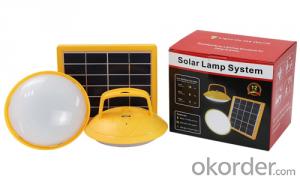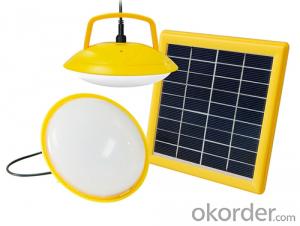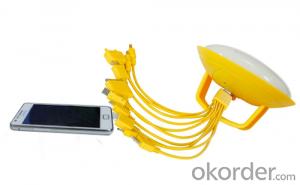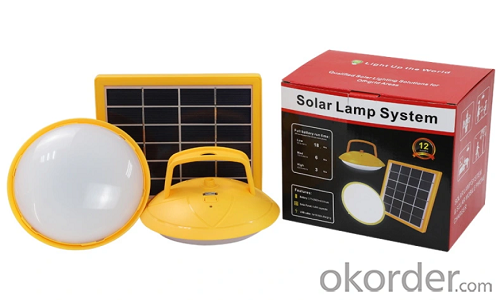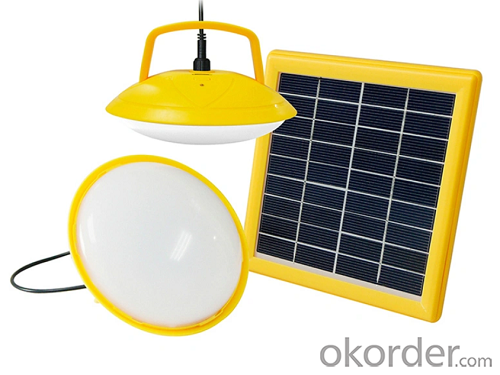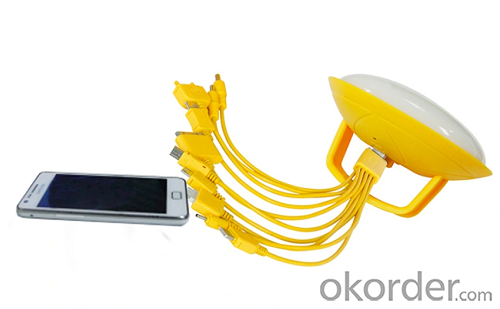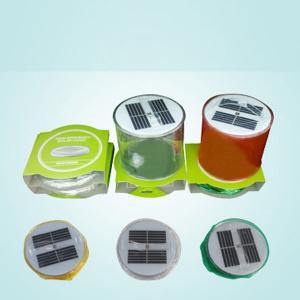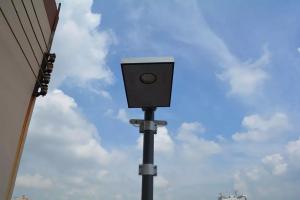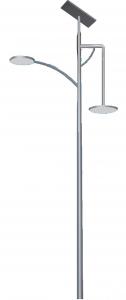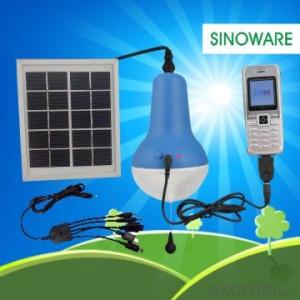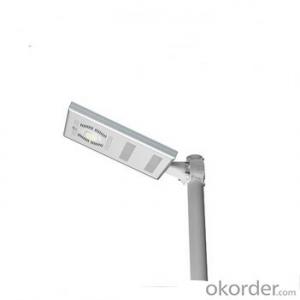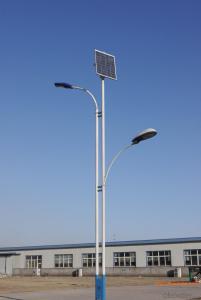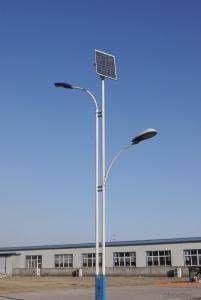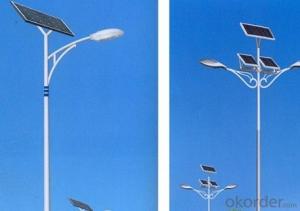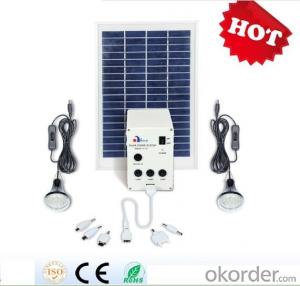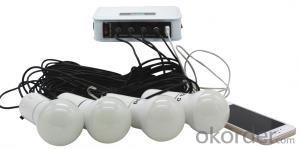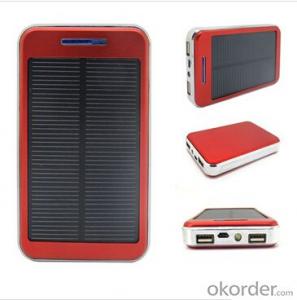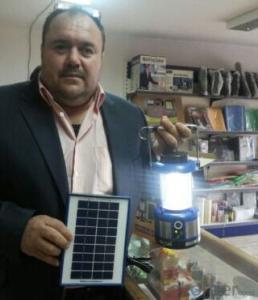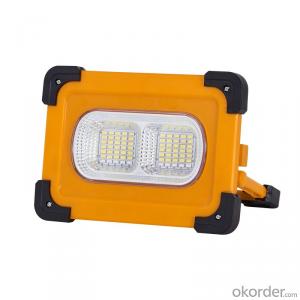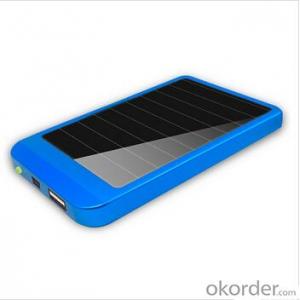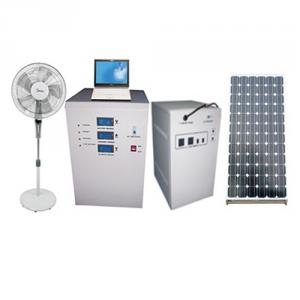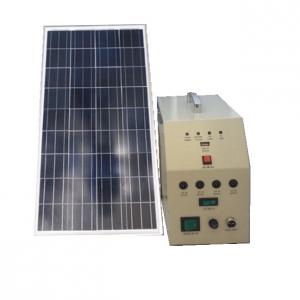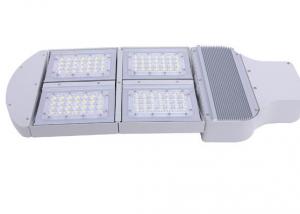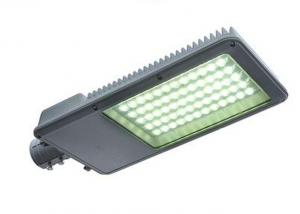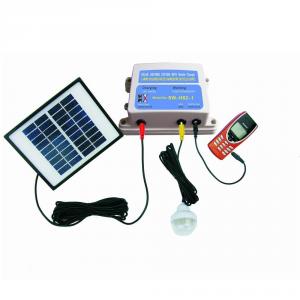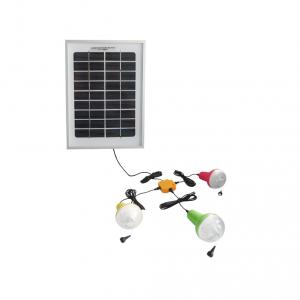Rock Solar Light Portable Solar LED Lighting Home System with Mobile Phone Charger
- Loading Port:
- Shekou
- Payment Terms:
- TT OR LC
- Min Order Qty:
- 10 set
- Supply Capability:
- 1000 set/month
OKorder Service Pledge
OKorder Financial Service
You Might Also Like
1. Features of Portable Solar LED Lighting Home System with Mobile Phone Charger
The product consist of solar panel and light (with build in battery) and other accessories.
2. Features of Portable Solar LED Lighting Home System with Mobile Phone Charger
- All in 1 solar DC small home lighting kit
- LED lighting and USB output in one device
- USB output for mobile and small device charging
- Over-charging/discharging protection
- Long life Lithium-ion Polyme battery more than 500 charge cycles.
- You could light up 2 rooms at same time, or take it outside for lighting
3. Specifications of Portable Solar LED Lighting Home System with Mobile Phone Charger
| Solar panel | 1pc*4W Poly crystalline with 5M cable |
| battery | built-in 3.7V/2600mah Liion battery each lamp |
| Lights source | 2pcs*1W led light with 5M cable, LM80 certificated,97% after 6,000 H |
| USB port | 1 USB port |
| functions | family lighting & phone charging |
| Accessary | 5-in-1 cable or 10-in-1 Charging cable for option |
| Charging time | 6 hours |
| Input | By solar or Micro USB |
| Materials | Pure ABS +PC |
| Warranty | 1 years |
4. Applications
- 4W/6V solar panel with 5M cable
- 1W bulb with 5M cable,with 2600mAh Lithium battery build in
Can put on desk for reading; Portable torch for outdoor
5. Packages

- Q: Are solar lights resistant to electromagnetic radiation?
- Solar lights do not tolerate electromagnetic radiation. Electromagnetic radiation, encompassing radio waves, microwaves, infrared radiation, visible light, ultraviolet radiation, X-rays, and gamma rays, can hinder the operation of solar lights. These lights depend on sunlight absorption for generating electricity, and any obstruction or interference from electromagnetic radiation can disturb the charging process and impede their functionality. To achieve maximum efficiency and performance, it is crucial to position solar lights in areas devoid of electromagnetic interference.
- Q: Are there solar lights with GPS tracking capabilities?
- Yes, there are solar lights available in the market with GPS tracking capabilities. These lights are designed to harness solar energy during the day and use it to power their built-in GPS tracking system. This feature allows users to track the location of the lights in real-time, making them ideal for various applications. For instance, in outdoor security lighting, solar lights with GPS tracking can help monitor and track the movement of potential intruders. Additionally, in remote areas or during emergencies, these lights can be used to provide illumination while also allowing users to locate them easily. Overall, solar lights with GPS tracking capabilities offer enhanced functionality and convenience in various scenarios.
- Q: Can solar lights be used for street art or murals?
- Certainly, street art or murals can definitely utilize solar lights. When it comes to outdoor spaces like streets or walls, solar lights offer a wonderful means of incorporating an artistic touch while also providing illumination. They possess great versatility and can be easily installed in various locations without the need for complex wiring or electrical connections. Solar lights come in a vast array of designs, shapes, and colors, making them ideal for enhancing the visual appeal of street art or murals. By using solar lights, one can draw attention to specific elements or areas of the artwork, resulting in a captivating and dynamic effect. Through strategic placement of solar lights around the artwork, artists have the ability to create a unique lighting display that adds depth and dimension to their creations. Furthermore, solar lights are both eco-friendly and energy-efficient. These lights operate by harnessing sunlight during the day and storing it in batteries, which subsequently power the lights during the night. By utilizing this sustainable energy source, not only does it reduce the environmental impact, but it also eliminates the need for constant maintenance and electricity costs. In conclusion, solar lights present an incredible opportunity for artists to elevate their street art or murals. They provide a creative avenue to illuminate and showcase artwork, all while being environmentally friendly and cost-effective. Thus, whether it involves accentuating specific details or crafting an enchanting lighting display, solar lights prove to be an excellent choice for street art or mural projects.
- Q: Can solar lights be used for outdoor exhibitions?
- Yes, solar lights can definitely be used for outdoor exhibitions. Solar lights are a great option for outdoor lighting as they are energy-efficient, environmentally friendly, and require no wiring or electricity. They can be easily installed and moved around without the need for professional assistance. Solar lights also come in various styles and designs, allowing you to choose the ones that best suit the theme and ambiance of your outdoor exhibition. Additionally, solar lights can provide a soft and pleasant glow, enhancing the overall aesthetic appeal of the exhibition.
- Q: What is the meaning of the solar controller battery indicator light
- After discharge, the internal active material can be regenerated by charging the stored energy into chemical energy, and chemical energy can be converted into electrical energy when the discharge is needed. The battery is called Battery (Storage), also known as the two battery.
- Q: How do solar lights handle power fluctuations due to shading or obstructions?
- Solar lights typically have a built-in feature called "shade tolerance" that enables them to handle power fluctuations caused by shading or obstructions. This feature allows the lights to automatically adjust their power output, dimming or turning off temporarily when shaded, to preserve energy and maintain a steady light output. Additionally, some advanced solar lights use multiple solar panels or have larger battery capacities to compensate for power fluctuations and ensure continuous operation even in shaded or obstructed areas.
- Q: Do solar lights have adjustable brightness levels based on ambient light?
- Yes, most solar lights come with adjustable brightness levels that automatically adjust based on the ambient light.
- Q: Are solar lights suitable for rooftops?
- Yes, solar lights are suitable for rooftops. They are easy to install, require no wiring, and use renewable energy from the sun to provide illumination. They are also cost-effective and environmentally friendly, making them a popular choice for rooftop lighting solutions.
- Q: Can solar lights be used for outdoor swimming pools or spas?
- Yes, solar lights can be used for outdoor swimming pools or spas. Solar lights are a great option for illuminating outdoor spaces, including pools and spas, as they do not require electrical wiring and rely on the sun's energy to charge. They are also waterproof and designed to withstand outdoor conditions, making them suitable for use in these areas.
- Q: Can solar lights be used for temporary construction lighting?
- Yes, solar lights can be used for temporary construction lighting. They are portable, easy to install, and do not require any electrical connections. Solar lights can provide sufficient illumination for construction sites and are a cost-effective and eco-friendly lighting solution.
Send your message to us
Rock Solar Light Portable Solar LED Lighting Home System with Mobile Phone Charger
- Loading Port:
- Shekou
- Payment Terms:
- TT OR LC
- Min Order Qty:
- 10 set
- Supply Capability:
- 1000 set/month
OKorder Service Pledge
OKorder Financial Service
Similar products
Hot products
Hot Searches
Related keywords
